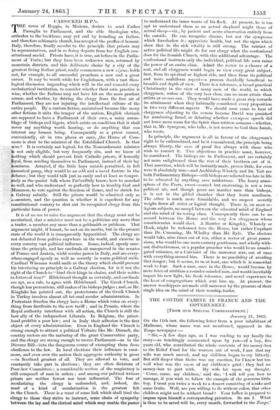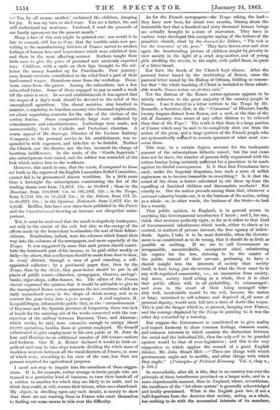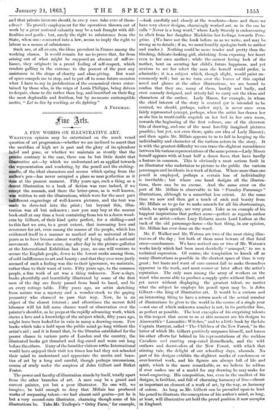THE COTTON FAMINE IN FRANCE AND THE GOVERNMENT.
[Fuom OUR SPECIAL CORRESPONDENT.]
January 21, 1863. ON the 11th inst. the following letter from a poor inhabitant of Mulhouse, whose name was not mentioned, appeared in the Temps newspaper :—
" Sir,—A few days ago, as I was reading to my family the story—so touchingly commented upon by you—of a boy, five years old, who contributed the whole contents of his money-box to the Relief Fund for the weavers out of work, I saw that my wife was much moved, and my children began to cry bitterly. But still deeper than theirs was my emotion, for I knew but too well what was the cause of my children's grief : they had no money-box to part with. My wife hit upon my thought.
Come, come, my children,' said she, I will tell you how to manage, if you wish to follow the example of the generous little boy. I treat you twice a week to a dessert consisting of a cake and some fruits. Vell, are you willing to do without cakes, that other children might not be without bread? Your father is prepared to impose upon himself a corresponding privation. So am I. What is thus to be saved will be, every month, forwarded to the Temps.'
—‘ Yes, by all means, mother,' exclaimed the children, jumping for joy. It was my turn to shed tears. You are a father, Sir, and will understand my weakness. Enclosed, I send the proceeds of our family agreement for the present month."
Many a fact of this sort might be pointed out; nor would it be fair to conceal, still less to deny, that the terrible crisis now pre- vailing in the manufacturing districts of France served to awaken feelings of htunau love and benevolence which were exhibited here and there in the most affecting manner. Mothers taught their little ones to give the price of promised and anxiously expected toys. Children, with a smile on their lips, brought to the col- lector the money hoarded up for Punchinello. Poor journey- men, female servants, contributed to the relief fund a part of their hard-earned wages. Donations came from the workshop. Dona- tions came from the garret. Among the subscribers, not a few subscribed twice. Some of them engaged to pay so much a week till the crisis is over. In several establishments it was agreed that the wages of a day's work should be devoted to the relief of the unemployed operatives. The choral societies, nine hundred in number, comprising no less than seventy-two thousand orpheonists, set about organizing concerts for the sake of the victims of the cotton famine. Sums comparatively large were collected by schoolmasters and schoolmistresses. Gatherings were made, not unsuccessfully, both in Catholic and Protestant churches. A warm appeal of Mr. Sauvage, Director of the Eastern Railway Company, to the personal service in his establishment, was re- sponded to with eagerness, and bids fair to be fruitful. Neither the Church, nor the theatre, nor the bar, incurred the charge of heartless indifference. In the ranks of the "Garde Imperiale " also subscriptions were raised, and the soldier was reminded of the link which unites him to the workman.
However, this much is sure, that the totals, if compared to those set forth in the reports of the English Lancashire Relief Committee, cannot fail to be pronounced almost worthless. In a little more than a fortnight the subscriptions constituting the list of the trading classes rose from 74,4671. 75c. to 90,000f.; those in the illoniteur, from 100,0001. 15c. to 181,186f. 92c.; in the Temps, from 9,751f. 50c. to 51,3251. 75c.; in the Debats, from 67f. 7c. to 36,697f. 50c.; in the Opinione Nationale, from 3,2671. 45c. to 4,854f. Besides, lists have ever since been published in the Patrie and the Constitutionnel showing an increase not altogether unim- portant. .
Yet, it must be confessed that the result is singularly inadequate, not only to the extent of the evil, but also to the energy of the efforts made by the benevolent to stimulate the zeal of their fellow- citizens. Numberless, indeed, were the schemes which found their way into the columns of the newspapers, and more especially of the Temps. It was suggested by some that each person should contri- bute the fourteenth part of his income, to be paid either weekly or daily—by others, that a collection should be made from door to door, in every district, through a man of good standing, a self- appointed collector ; by a provincial paper first, then by the Temps, then by the SAcle, that poor-boxes should be put in all places of public resort—churches, synagogues, theatres, savings'- banks, cigar-shops, coffee-houses, &c. The editor of the France chorale expressed the opinion that it would be advisable to give to the unemployed Rouen cotton-spinners the ten centimes which are daily squandered away in the shape of drink-money; and so to convert the pour Loire into a pour manger. A civil engineer, M. Leopold Dupuy, informed the public that, in the "arrondissement of Bayonne and the Spanish province of Guipuzcoa, there was lack of hands for the carrying out of the works connected with the con- struction of the railway between Bayonne, Trutt, and Alsatsua ; which works, he said, were extensive enough to occupy about 20,000 operatives, besides those at present employed. He himself volunteered to give employment in his own yards at St. Jean de Luz and Ilendaye to an additional number of 500 terrace-makers and hodmen. One M. A. Menier declared it would be both ex- pedient and easy to take steps towards dividing the whole mass of workless weavers between all the rural districts of France, in none of which were, according to his view of the case, less than ten persons required for agricultural purposes.
I need not stop to inquire into the soundness of these sugges- tions. It is, for example, rather strange to invite people who are trained to a particular kind of business, to turn their hands all of a sudden to another for which they are likely to be unfit, and to think they could, at will, resume their labour, when once abandoned. My object, in dwelling upon any such details, is merely to show that there are not wanting those in France who exert themselves in finding out some means to tide over the difficulty.
As for the French newspapers—the Temps taking the lead— they have now been, for about two months, blazing about the lamentable fact that a hundred and sixty thousand human beings are actually brought to a state of starvation. They have in various ways developed this energetic saying of the fathers of the primitive church, cited by the Journal des Debate, " The rich is but the treasurer of the poor." They have drawn over and over again the heartrending picture of children taught by poverty to view society in the light of a cruel step-mother, and of young girls strolling the streets, in the night, with pallid faces, in quest of a bitter bread.
Nor have the heads of the Church kept silence. After the pastoral letter issued by the Archbishop of Rouen, came the pastoral letter issued by the Bishop of Orleans, bidding us remem- ber that "the whole teaching of Christ is included in these admir- able words, Omnes antem vos fratres estis."
Yet the distress of the Rouen cotton-spinners appears to be utterly unknown to the great majority of the country-people in France. I see it stated in a letter written to the Temps by Jr. llousselle, a barrister, that, in the " Commune" of Blicourt, hardly twenty leagues distant from Rouen, not a soul, at the date of the 5th of January, was aware of any other distress to be relieved than that of the Pope ? The truth is that there is a large portion of France which may be said to be completely shut out from the action of the press, and a large portion of the French people who are systematically sacred to remain ignorant of what most con- cerns them.
This may, to a certain degree, account for the inadequate amount of the subscriptions hitherto raised ; but the real cause does not lie there, the number of persons fully acquainted with the cotton famine being certainly sufficient for a provision to be made against its direful consequences. Is it then that Frenchmen have sunk, under the Imperial despotism, into such a state of selfish supineness as to become insensible to everything ? Is it that the sound of the drum is better calculated to stir them up than the squalling of famished children and disconsolate mothers? Not exactly so. But the notion prevails among them that, whenever a national calamity breaks out, it is the business of the nation, acting as a whole- -or, in other words, the business of the State—to look for a remedy.
That public opinion, in England, is in general averse to anything like Governmental interference I know ; and I, for one, think that aversion perfectly right, BO far as it refers to that kind of Governmental interference which tends . either to check or to control, in matters of private interest, the free agency of indivi- duals. Again, I take it to be most desirable, when the Govern- ment is so constituted as to do wrong, that it should do as little as possible or nothing. If we are to call Government an irresponsible, uncontrollable, omnipotent chief, substituting his caprice for the law, claiming to be the master of the public instead of their servant, professing to have a clearer insight into the interests of society than society itself, in fact, being just the reverse of what the State must be in any well-regulated community, i.e., an emanation from society, nay more, society itself acting as a whole, then it is clear that public affairs will, in all probability, be mismanaged ; and even in the event of their being managed toler- ably well, incalculable would be the evil, because the nation at large, untrained to self-reliance and deprived of. all sense of personal dignity, would soon fall into a state of death-like torpor. This is just the danger which is, at present, hanging over France, and the courage displayed by the 7'emps in pointing to it was the other day rewarded by a warning.
But suppose the Government so constituted as to give reality aad impart harmony to those common feelings, common wants, and common interests in which consists the distinction between the social and the individual life, then the only evil to be guarded against would be that of over-legislation ; and this is the very supposition to which applies the remark of a great English thinker, Mr. John Stuart Mill :—" There are things with which governments ought not to meddle, and other things with which they ought." (Principles of Political Economy. Vol. 2, chap x., p. 505.) So unavoidable, after all, is this, that in no country was ever the principle of State interference practised on a larger scale, and in a more objectionable manner, than in England, where, nevertheless, the excellence of the "let-alone system" is generally acknowledged and loudly proclaimed. What is the English poor law, if not a bold departure from the doctrine that society, acting as a whole, has nothing to do with the economical interests of its members, and that private ini crests should, in every case, take care of them- salves? To provide employment for the operatives thrown out of work by a great national calamity may be a task fraught with dif- ficulties and perils ; but, surely the right to subsistence from the State, when Once converted into a law, seems to imply the right to labour as a means of subsistence.
Such are, at all events, the ideas prevalent in France among the -working classes. It would remain for me to prove that, far from arising out of what might be supposed an absence of self-re- liance, they originate in a proud feeling of self-respect, which renders galling in the extreme to the poorest of the poor any assistance in the shape of charity and alms-giving. But want of space compels me to stop, and to put off to some future occasion what I have to say in justification of the economical views enter- tained by those who, in the reign of Louis Philippe, being driven to despair, chose to die rather than beg, and inscribed on their flag the most deplorable and fruitless, but by no means contemptible motto, "Let us live by working, or die fighting."
A FREEMAN.
































 Previous page
Previous page